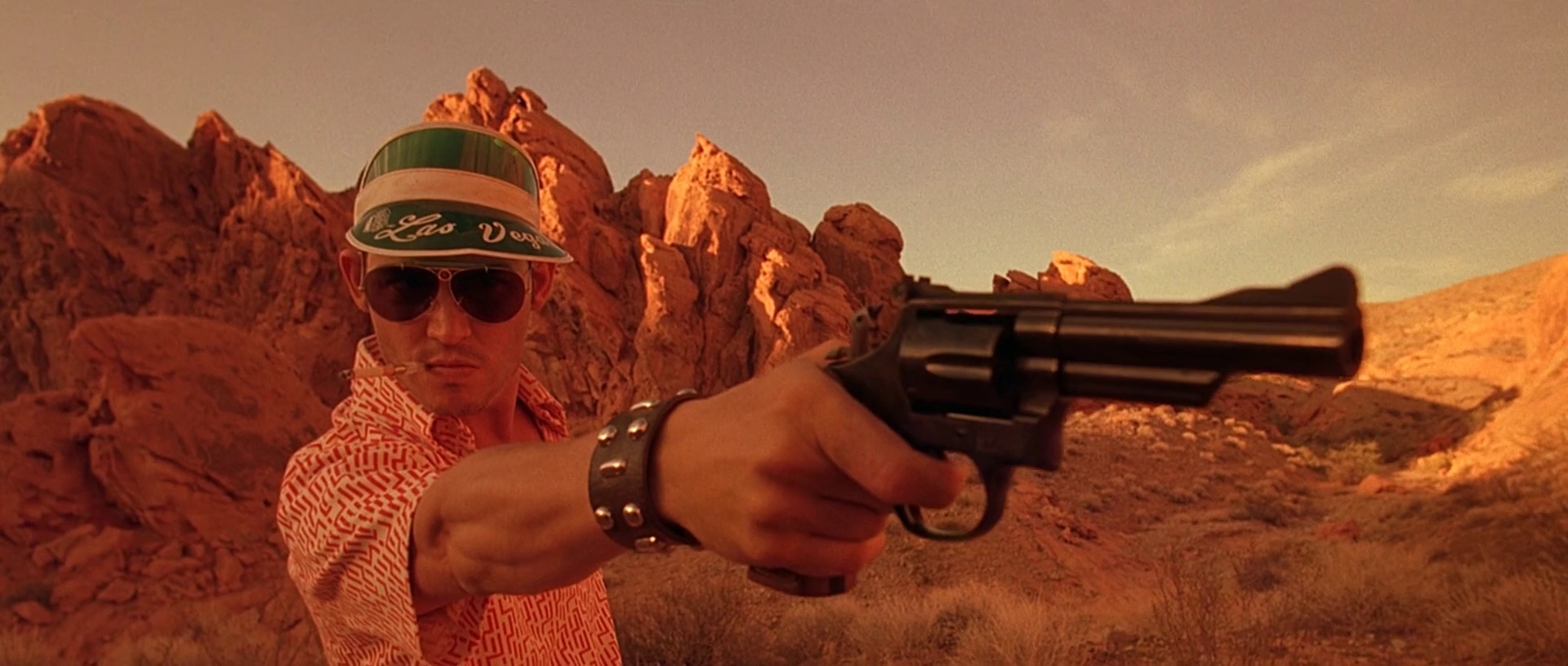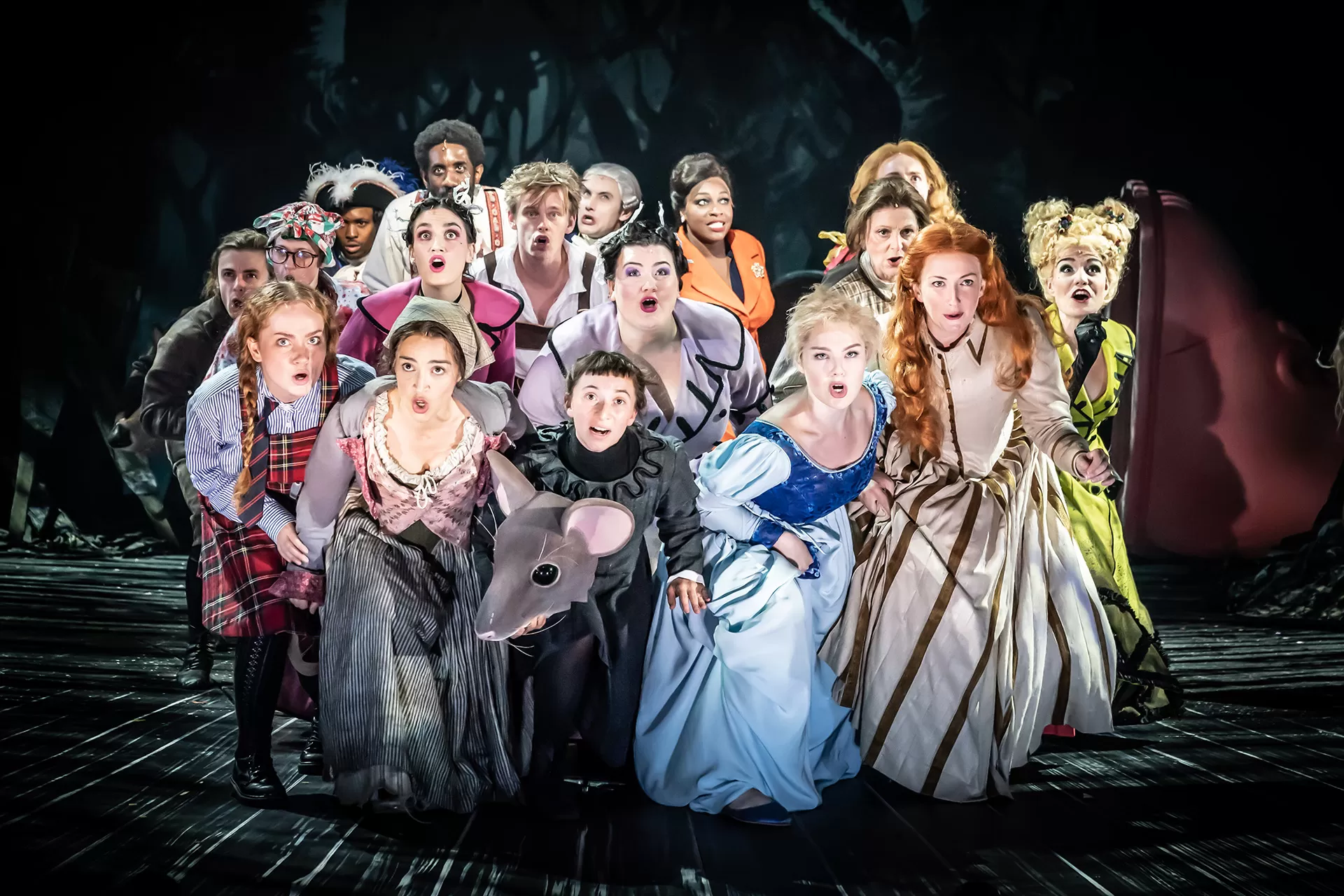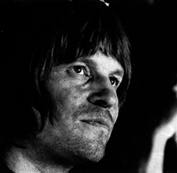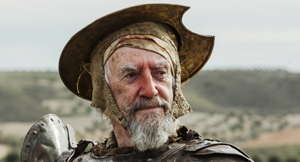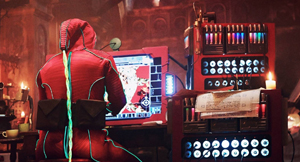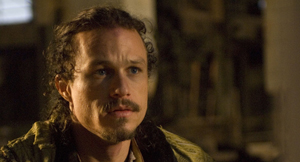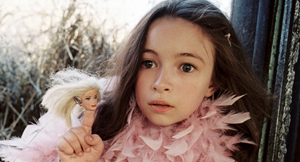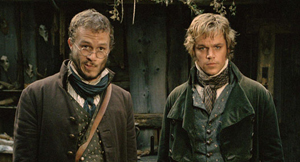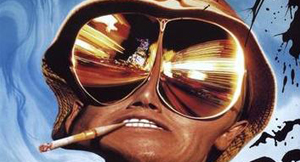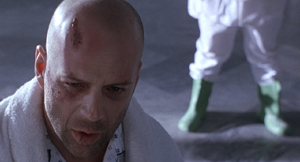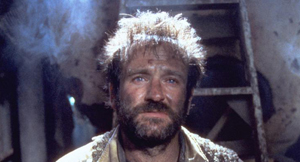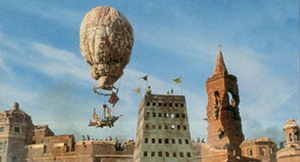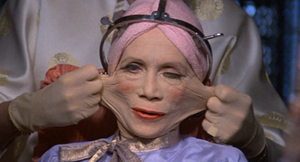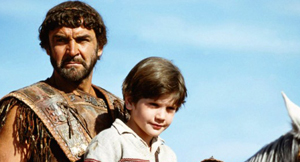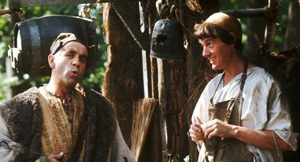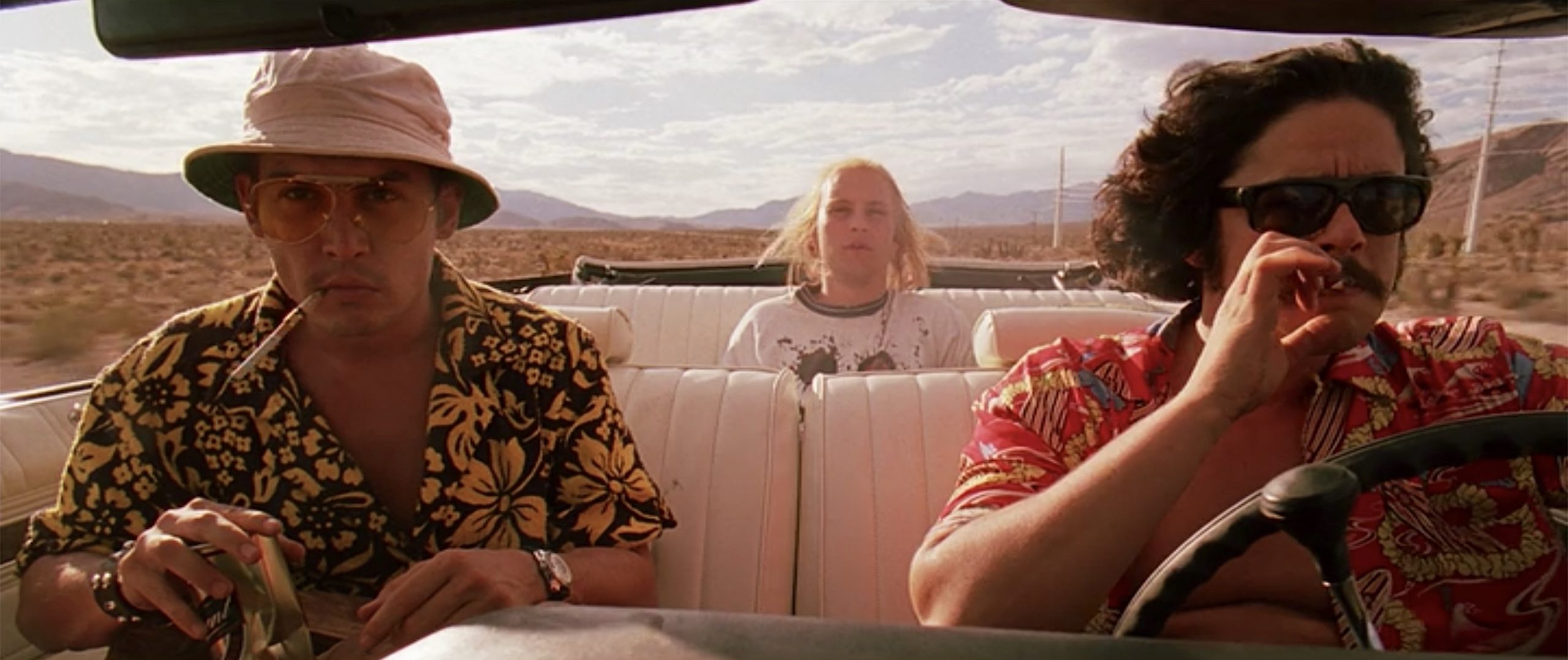
“It’s coming together. When you first put it together, you’ve chosen the block of marble, and somewhere in there is the film, is the statue. It’s like chipping away. You chip away and it comes closer to the thing you’ve imagined.”
It’s early December 1997, and Terry Gilliam is in his office in the West End of London – working on the post-production of his latest project, Fear and Loathing in Las Vegas, based on the 70s writings of Hunter S. Thompson.
Gilliam wrote the script with assistance from Tony Grisoni, at a frenzied pace. It was put together in eight days. He rejected it, and a further script took two days to prepare. Filming took place in Las Vegas during the summer, and the project has attracted many famous faces: Johnny Depp is the hero, with Benicio del Toro as his attorney. Also cropping up during the movie will be Christina Ricci, Gary Busey, Cameron Diaz, Lyle Lovett, Harry Dean Stanton and Ellen Barkin, amongst others.
Here, he talks to Dreams about Fear and Loathing, and his possible next project, The Defective Detective, about a burnt out cop who ends up in a child’s fantasy world.
What have you been doing this morning, Terry?
We’ve been trying to put some music on the film. We’re at that stage – fiddling with music. One room is busy trimming the film shorter. And I’m in the other room where we’re slamming sounds on.
Music will be crucial to a project like this.
Yes, there’s a lot of different kinds of music on this thing. It keeps shifting gears and we can use the music to tell the audience where they are. In a lot of cases we’re using stuff that’s obvious, it’s obvious music. The film itself needs signposts along the trail and the music is one way of doing this.
How do you feel about the movie at the moment?
You’ve got a book and you write a script that hopefully captures the book which still works as a script and then you go and shoot the movie and you deal with all the realities of shooting. Some things go the way you want and some things don’t, but then you put together ways that you intended when you’ve wrote it and shot it and you realise that half the stuff doesn’t work that way. So then you start shifting it around. What’s so interesting about this stage is trying to find the best film from of all the stuff we’ve done as opposed to best version of the script or the best version of the book.
I read a couple of days ago that Katherine Helmond was in the movie. She’s given you two of your best performances – Mrs Ogre and Mrs Lowry. What role have you given her in this one?
Unfortunately she has a very small one. She turns into a moray eel. She’s a reception clerk in a hotel. She becomes a moray eel. Due to the effects of LSD on the hero.
Do you think there’ll be a controversy when the movie is released?
Probably. I hope the movie becomes fairly controversial. I hope it makes a noise – I don’t want it to go unnoticed. A lot of people will get angry but they’ll probably get angry for the wrong reasons though. I actually don’t think it’s a drugs movie, strangely enough.
Why is that?
If you make a film where people are at a bar drinking and smoking a lot, you don’t say it’s an alcoholics’ movie, or a smokers’ movie. It’s not about that. The fuel may be drugs just like in other movies, with Sam Spade the fuel may be alcohol and cigarettes. What we do is allow our characters to get caught in a distorted world, which is already distorted by reality. We make it an altered reality which may be for the better and sometimes for the worse, depending on how much you have just imbibed.
Do we get to see the bats?
Oh, I’m not gonna tell you that… you gotta pay your money!!!
What assistance did you get from Hunter S. Thompson?
Hunter was on the end of the phone quite a bit. What was the most useful thing was that Johnny spent a lot of time with him. And basically stole a lot of his clothing and his car which were then used in the movie!!!
Are there any filing cabinets in the movie?
Let me see, I don’t think so, I think this may be free… there is a cage in the movie. There’s always been cages in my movies.
And in The Defective Detective there’s Nicolas Cage?
There you go, see.
Has The Defective Detective been green lighted yet?
No. This is one of the long unclotting open wounds that I carry with me. You’re pushing a project up the hill and then it rolls back on top of you. You push it up and it rolls back again. I’m not sure if we’re pushing it up or if it’s rolling back at the moment.
I understand that in The Defective Detective, you intend to film some of the fantasy sequences that you were unable to do in Brazil. Is this true?
Not really. The script started from me going into my files my drawers and digging out all the bits I’d cut out of Brazil and Munchausen and everything else I’d ever done. These are all good bits, let’s knit them together. And some of them have found their way in and some haven’t. It was a starting point, really.
Would it share more with Brazil, Time Bandits & Munchausen than your other movies?
It’s all of ’em – it combines all of those elements. It’s all of those things – like Fanny and Alexander was kind of a compendium of all the best of Bergman. That’s the idea on this one.
Do you intend to shoot in the UK or in the US?
Well the idea was that I’d do it here. I mean it’s proving to be a very frustrating project. It’s the one I want to do and it’s the one that keeps eluding me and, because of different glitches that come along I end up doing other films like 12 Monkeys and Fear and Loathing. I’ve had this ever since I finished Fisher King a few years ago.
Is Don Quixote still a possible future project?
Well again it’s another one that floats around. I’ve never felt we’d got the script right; it’s a very complex project to get it right. It’s a bit like a painter who’s got several canvasses going at once. You walk away from it for a bit and don’t look at it. And you look back at it and you begin to see what’s right and what’s wrong. And this is one we haven’t got right yet. That’s all I can say.
I understand that during the filming of Munchausen you met Fellini – what happened?
Actually the first time I met him was when Jonathan Pryce and I were in Rome promoting Brazil. He was shooting Ginger and Fred. We went down to the set – he was a big hero. What was interesting about being in Rome [making Munchausen] was that there I was in Cinecitta with Dante Ferretti who had designed several of his films. I was on Fellini’s home turf with his people – an interloper clearly. Federico would pop into the art department – my office was in the middle of the art department. He would pop in occasionally and he would bless the whole thing and walk out.
One of the funniest things was when he was shooting Intervista, he actually put Mastroianni up in this Mandrake the Magician costume in a tree right outside the door of my office in the art department so we couldn’t get in and out while he was shooting. He was saying “This is mine; this is my place. You work when I let you”. He was great, I just loved him. And then during the course of the film, there were several dinners arranged which never quite happened and then finally on the very last night before I left Rome after we’d finished shooting finally I had dinner with him and Giulietta Masina and Dante Ferretti and it was great. One of the great memories was wandering around after dinner around the Trevi fountain arm in arm with Fellini – that was worth all the pain of Munchausen.
How do you feel about the pain of Munchausen, now. Do you feel you have learnt from it, adding to your experiences, or do you box it away at the back of your mind?
It all goes into the computer. Certain things you don’t do again. And there’s certain things you do. It’s because it was so painful that I’m not really the best judge of the whole thing. The pity is, the thing that bothers me the most was not the making of the film, or any of that. It was the final hurdle in dealing with the studio, trying to get them to show an interest in the movie.
I agreed to cut it down to under two hours. I think it probably would have been a better film at two hours and five minutes. It just needed a bit more space and air around it. And I did and I mean it was my cut but, they made all the noises that if I co-operated with them they would then get behind the thing and that was then what they didn’t do That was a big betrayal and that’s what hurts the most, not anything else. It’s the only time I made a trim for political reasons and it didn’t pay off. That’s what really is painful because the film would benefit from a few more minutes in there. It’s a pacing thing. It’s not about scenes, it’s about pacing.
In The Fisher King, Tom Waits puts in a really memorable performance. I’ve been a fan of Tom for ages. It was a real shock to see him since he wasn’t credited. How did Tom get involved?
He was a friend of Jeff Bridges, basically. He said, “You ought to meet Tom”. It’s funny because when I met him and even in the course of making the film, I’d never heard a Tom Waits record. I’d never listened to them at all. I just met him and liked him immediately. So into the film he went, and he was great. The studio was trying to cut him out. They felt it wasn’t advancing the narrative in any significant way so they thought that was things that could go. They were totally wrong.
There’s been a lot of discussion regarding 12 Monkeys about the insurance woman at then end. Was the intention of that scene to close any ambiguities in the movie? Or should the ambiguities remain open?
I think there are several ambiguities but the intention was in our minds there was no question that she was the scientist from the future. My reading of the whole thing is that she gets the virus with which she is able to go back to the future and eventually save the future. Five billion people still die – all that’s necessary. So it was a very long term solution!!!
Quite honestly I like the fact there’s all of this discussion. I just read something on PythOnline – the whole thing about the kid – is it all in the kid’s head. I think that’s wonderful so I don’t want to limit the possibilities. Certainly our intention was that she is the scientist. She does get the virus and she goes back to the future and somehow allows the future generations of her generation to eventually reclaim the earth. A lot of people can’t accept the idea that five billion people have to die in the course of all this.
Quentin Tarantino has said that you taught him the importance of delegation in movie making, but I understand you have very specific demands about what goes on screen. How does your relationships with other artists on the movie actually work?
You gather hopefully a really good group of people and then spend a lot of time talking about what you’re trying to do. I don’t spend a great deal of time saying “Roger [Pratt], you’ve got to light it like this”. We’ll talk about it. It’s a very collaborative thing. You discuss it – they’ve got ideas and I’ve got ideas and we tend to leapfrog. I start with a specific idea and they come up with a better one and I come up with a better one and they come up with a better one. It works that way so, if everything is rolling right, my function is just to be the filter to say, “Yes, that goes in, and that doesn’t go in.”
I end up getting what I want, but I can’t say that I did it. Some directors I hear about are just so specific. They leave no room for creative partners to do anything and I don’t want that. I want everybody to bring their own skills to the film and then I take full credit for the whole thing in the end. That’s where the unfairness comes in. It’s a lie. You can print that!
I understand that in March ’98, you’re going to meet up in Aspen with your Python colleagues.
There’s this comedy festival there and we all seem to have agreed to turn up there for an evening of I don’t know what. It’s really I think just a Q&A.
Do you expect to put any firm plans together at that meeting?
Well when we got together in May we decided we were seriously going to talk about doing another film. And in October, Mike, Terry and Eric were supposed to be getting together to get started. They didn’t, so nothing’s happened so far, so we’ll get together in March in Aspen. We’ll talk again and see what happens. I think it’s less likely than we thought it was going to be in May. We all seem to be so stuck in doing our own things now.
You said before that you go to Hollywood to get a bag of money and you go away and make your movies. If you didn’t get any money from Hollywood in the future for whatever reason, what would you do with the rest of your life?
Go to France and get money. Go to Germany and get money. Go everywhere else and get money!!! What’s interesting about 12 Monkeys was that 52% of the budget was from England, Germany, France and Japan. So it was really a co-production and on this one even though Universal has come in, there’s been a lot of pre-sales before Universal got in, to Germany and France. It’s kind of a hybrid – there’s a lot of money floating around in Europe at the moment. The trick is that if I can’t get it in the States then I’ll go elsewhere and ultimately I’ll have to reduce the scale of what I’m trying to do to whatever I can get. It’s as simple as that.
What future work remains on Fear and Loathing?
In the next few weeks we’ll get a fine cut of the thing and then the soundtrack becomes the biggest thing plus a lot of the opticals and the special effects that’re still in the works. The idea hopefully is that we’ll be done in time for Cannes.
So it’ll be ready for May?
Yeah. And I think they’re talking about releasing it in the States in May as well.
Are you hoping it’s going in competition?
I don’t care if it goes in competition or not. It doesn’t really matter to me. I just wanna make sure we’ve got the best film we can get out of it. So far the thing seems to be forming itself nicely.
